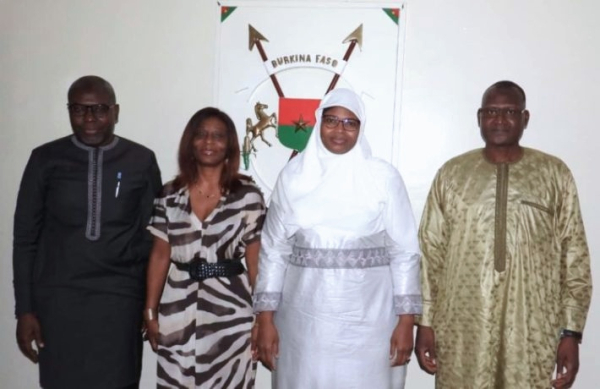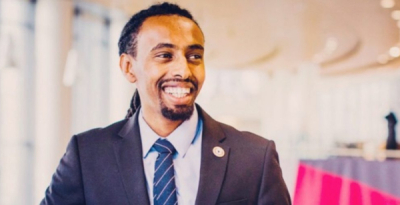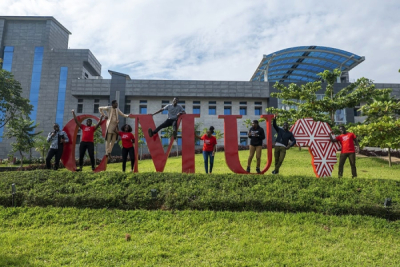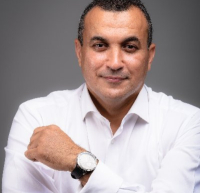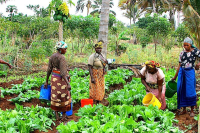In Africa, with the acceleration of digital transformation, there is currently a shortage of digital skills. The situation is concerning for various governments, which are stepping up efforts to create digital skill pools and reduce unemployment at the same time.
The Smart Africa Digital Academy (SADA) recently launched a national digital academy to promote digital skills in Benin. The founding memorandum of understanding was signed, last Thursday (September 8), by Lacina Koné (photo, right), CEO of Smart Africa, and Aurelie Adam Soule Zoumarou (photo, left), Beninese Minister of Digital Economy.
According to Lacina Koné, “SADA is a direct solution to the digital skill shortage facing Benin, in particular, and Africa as a whole. SADA Benin will support [authorities’] agenda that aims to place digital skills at the core of Africa’s current and future socioeconomic development.”
In the framework of the partnership agreement between Bening and the Smart Africa alliance, forty cybersecurity and artificial intelligence instructors are already being trained. Once their training is completed, those instructors will train and pass on their skills to other instructors to build a pool of qualified instructors. The SADA also plans to offer advanced ICT courses to managers and teachers.
Thanks to the reforms and flagship projects in the Beninese government's strategic plan, the country jumped from the 177th spot in the UN e-Government Development Index in 2016 to the 157th spot in 2020.
The SADA Benin initiative will therefore be a key support to the country’s digital transformation plan, which aims to transform Benin into a digital services hub in West Africa.
For Minister Aurelie Adam Soule Zoumarou, the alliance will "consolidate the efforts already undertaken by the Republic of Benin in the framework of its national development program and provide new cooperation opportunities.”
SADA Benin is the fourth national academy launched by Smart Africa since January 2022. The first three were in Congo, Rwanda, and Ghana. The alliance plans to launch similar academies in Burkina Faso, Côte d'Ivoire, Tunisia, Kenya, the Democratic Republic of Congo, Djibouti, and Sierra Leone in the coming months.
Since it began operations in August 2020, focusing on the Capacity Building for Decision Makers (CBDM) module, SADA has trained approximately 3,000 decision and policymakers across 26 countries on topics related to digital transformation and hot emerging technologies. Its goal is to train more than 22,000 people in partner countries, by 2023.
Samira Njoya
For years now, Burkina Faso, like most African countries, has been taking action to accelerate its digital transformation. However, the country does not have the resources required for an efficient transformation. Hence the importance of UNDP support.
Last Thursday, September 8, Aminata Zerbo/Sabané, Burkina Faso’s Minister of Digital Transition granted an audience to Elsie Laurence Chounoune, the UNDP resident representative. During the audience, the two officials reviewed the digital transformation actions already carried out by Burkina Faso.
"UNDP is much involved in digitization efforts. We believe digitalization should be at the core of our actions. This is a first contact meeting to review the actions already undertaken, the priorities, and how the UNDP can support Burkina Faso in its efforts to digitize its economy. This is our core priority because, without the digital economy, development objectives can not be achieved,” said Elsie Laurence Chounoune explaining the aim of her visit.
As Burkina Faso’s partner since 1966, the UNDP supported several government programs including the recent project ProFeJeC to improve the soundness of businesses launched by women and young people. The project led to the creation of FasoHub, a website allowing users access to digital resources to develop entrepreneurial skills.
According to a United Nations ranking on the digitalization of public services in African countries, Burkina Faso ranked 32nd in 2020. To get back on track, the country set up a national strategy for the development of its digital economy.
The World Bank-funded strategy, called e-Burkina, aims to build an efficient public and private administration thanks notably to ICTs and promote entrepreneurship, with a focus on agriculture and rural sector activities. Several other digital projects are also underway throughout the country and the government can now count on the UNDP for support in its digital transformation efforts.
Samira Njoya
The coronavirus pandemic demonstrated the crucial role of digital tools in every sector of the economy. An Ivorian entrepreneur has decided to use those tools to improve the income of informal workers.
Jevebara is a digital solution launched by Ivorian start-up CogIT Business, this year. It allows informal workers to find work and boost their income.
“Our goal was to develop a solution that would help us in our daily businesses, allow everyone to find workers but also enable ‘grouilleurs’ [Ivorian slang for starters, ed. note] to prosper,” indicated CogIT founder, Louis Omgba.
The solution has a mobile app available for Android devices only. Through the app, a user can register either as a job provider or an informal worker by following dedicated steps. Once registered, job providers can post jobs and workers can select the jobs they want. The startup acts like a middleman with an escrow account, which releases the payment to the worker, once the job performed is validated. When the payment is released, the worker can then withdraw via Orange Money, MTN Mobile Money or Wave Money. Since its launch on August 27, 2022, the Jevebara Android app has been downloaded more than a thousand times with a rating score of 4.6 out of 5.
Adoni Conrad Quenum
The former restaurant owner started a ride-hailing business in his native country to provide users with a safe and convenient transportation service. Thanks to the solution, he was recently selected for a Google program that will allow him to reach new horizons.
Habtamu Tadesse (photo) is an Ethiopian tech entrepreneur who founded Zaytech, a startup behind the ride-hailing solution ZayRide, in 2016. With his ride-hailing solution, available as a mobile app -for Android and iOS devices, he connects users to taxi drivers. Apart from the mobile app, the solution is also accessible through a call center, that allows users to request delivery or ambulance dispatch services.
With ZayRide, Habtamu Tadesse is contributing his experience to solve a crucial insecurity challenge. Indeed, the tech entrepreneur, who was once an Uber driver in the U.S., is well aware of how insecure it could be waiting for public transport services in his native country. So, he decided to adapt his Uber experience to local realities.
“We are trying to address the existing unsafe, expensive, and inconvenient means of transportation by rolling out an innovative taxi-hailing application designed to work on Africa’s slow Internet,” he told Tech In Africa in 2018.
Less than two years after inception, Zayride already had 30,000 users, earning ZayTech several accolades including the title of the startup with the biggest market impact potential by Traction Camp Nairobi in 2017. ZayTech has also been selected to participate in the 2022 cohort of the Google for Startups Black Founders Fund. That selection entitles it to US$50,000 to 100,000 in funding and a 6-month training program to support its development.
Before launching ZayTech, Habtamu Tadesse was the owner of Basha Restaurant and Bar, a Boston-based restaurant he co-founded with his brother. They sold the restaurant in 2015 to fund the mobility project ZayRide.
Melchior Koba
In Africa, economically disadvantaged populations’ poor access to technological skills raises concerns about increasing inequalities in the job market. Actors are inking partnerships to ensure the digital economy benefits everyone.
Carnegie Mellon University Africa (CMU-A), the Mastercard Foundation, and the Rwanda government will train 10,000 African youth from economically disadvantaged communities in digital skills. For that purpose, the three parties signed a US$275.7 million agreement yesterday.
According to an official release, the investment provided by the Mastercard Foundation “includes a $175M endowment to perpetually fund CMU-Africa [...] and $100.7M to establish CMU-Africa’s Center for the Inclusive Digital Transformation of Africa.” The funds will help reach a broad audience as well as specific targets, including young women, youth with disabilities, and forcibly displaced youth. The beneficiaries will receive advanced training in information technology, electrical and computer engineering, and artificial intelligence. Some of the training programs will be delivered online.
According to the World Bank, millions of young Africans will be in the job market by 2030. For Farnam Jahanian, president of Carnegie Mellon University, "it's important to give them access to education in the high-tech fields that are driving the economies of the future.”
Rwandan Minister of Education, Valentine Uwamariya, indicated that the “strategic partnership with Carnegie Mellon University is one of the Government of Rwanda’s key investments to support the development of a critical mass of skills [...] required by the knowledge economy and to help accelerate Rwanda and the region’s socioeconomic transformation.”
The agreement between Carnegie Mellon University Africa and the Mastercard Foundation builds on a previous partnership between the two parties, as well as a successful 10-year collaboration between the Rwandan government and the academic institution.
Samira Njoya
In Africa, the shortage of tech skills is jeopardizing the continent’s ability to make the most of the digital economy. It is therefore urgent to facilitate access to digital skills training to have a skilled workforce.
The Republic of Guinea plans to transform its national school of posts and telecommunication into a national digital academy. The plan was disclosed by the Minister of Vocational Training Alpha Bacar Barry (photo), during a show on local radio Espace Guinée last Wednesday, September 7.
According to the government official, the national school of ôsts and telecommunication is an old academy that dates back to the 1940s. Despite its existence, it is still difficult for the private sector to find skilled software developers in the country. Therefore, the national digital academy will teach in-demand skills.
“We don’t want it to be like the Higher Institute for Distance Education (ISFAD), a reference academy. We don’t have the resources for that but, we will draw inspiration from what it does,” he explained.
In its 2018 report, "The Future of Jobs," the World Economic Forum estimated that about 65 percent of children entering elementary school today will end up in a job that does not yet exist. With the digital transformation accelerating everywhere, the International Finance Corporation (IFC) concurs in its "Digital Skills in Sub-Saharan Africa Spotlight on Ghana" report, noting that more than 230 million jobs in Sub-Saharan Africa will require digital skills by 2030.
By offering the youth a digital skills training academy, Guinea, which is also embarked on the digital transformation bandwagon, wants to create a skilled workforce that will enable it to capitalize on the booming digital economy.
Muriel Edjo
The Nigerian tech ecosystem has been thriving for years now, with solutions designed to make life easier for users in urban regions mostly, given the internet access inequality.
Chowdeck is a digital solution developed by a Nigerian eponymous startup founded in 2021 by Femi Aluko, Olumide Ojo, and Lanre Yusuf. It allows users to order meals from their favorite restaurants and get them delivered fast.
The solution has a mobile app, accessible on Android and iOS. To access Chowdeck services, users have to create an account by providing an email, a phone number, and a password. Once validated, the user can start ordering from the restaurants listed on the platform and get them delivered within 30 minutes. They can order African, Western, and Oriental foods. To allow them more choices, the startup is constantly looking for new restaurants to add to its base.
While it helps users get foods delivered fast, it also helps restaurants reach a broader audience, therefore increasing their revenues. The startup, which claims to have delivered 80,000 meals in the first half of 2022, has been selected to participate in the 2022 summer cohort of Y Combinator. The selection entitles it to up to US$500,000 financing from Y Combinator and access to an investor network that could support its expansion.
Adoni Conrad Quenum
With more than 20 years of managerial experience in the information technology sector, he has worked for national and international firms. Since 2021, he is overseeing the destinies of Algeria’s startup accelerator.
Sid Ali Zerrouki (photo) is an Algerian information security engineer. He is also the managing director of Algeria Venture, the first state-owned startup accelerator in Algeria. In that capacity, his missions include identifying and supporting local high-potential innovators whose success would make Algeria a tech hub and transform its economy.
During an interview with French TV channel Euronews, he explained that Algeria Venture’s goal is to give tech innovators the required resources to hit markets with quality solutions as well as attract local and international investors that would help them develop their businesses. In line with that goal, in April 2022, in Algier, the state accelerator launched the first cohort of Boost Competencies Entrepreneurship Program (BCEP), an accelerator program implemented in partnership with Google for Startups Accelerator Middle East and North Africa. The program boosted the capacities of the 14 startups, from seven Algerian wilayas (regions), that participated in that first cohort.
Sid Ali holds an information security engineering degree from the University of Constantine 1. He also has a master's degree in business administration from Paris Dauphine University and an executive MBA in international business and commerce from the Sorbonne Business School.
Before his appointment as the managing director of Algeria Venture (in 2021), he was a senator of the World Business Angels Investment Forum, from September 2020 to April 2021. His professional career started in 1998 when he became the IT project manager of Sonatrach, the state-owned oil company in Algeria. In 2001, he joined oil drilling equipment provider Schlumberger as an SDP Driller (assistant driller).
From 2002 to 2009, Sid Ali Zerrouki was OTA Algeria’s network rollout manager. He was later assigned to head the rollout and deployment department at VEON, in Burundi. In 2012, he became a consultant for Kenayn TIM consulting and then joined Huawei Algeria, in 2013, as the senior director of services.
After a stint at Millicom in Tanzania from 2014 to 2016, he joined Cybercom Group as a senior audit program manager. In December 2016, Sid Ali Zerrouki was recruited as Director of Operations for the Algerian company Confidential. The following year, Revotech appointed him as managing director before his appointment to lead Rail Telecom Spa from 2018 to 2021.
Melchior Koba
In the last few years, blockchain has become one of the important technologies used in the development of a wide range of IT solutions. In recent months, several games and service platforms using cryptocurrency and NFT technologies have made the news.
Nigerian blockchain gaming platform blockchain Metaverse Magna (MVM) announced, Monday (September 5), that it had secured US$3.2 million during a seed token sale round. Thanks to the funds raised, it plans to build Africa’s largest gaming decentralized autonomous organization (DAO) and offer gamers access to world-class opportunities.
According to Yele Bademosi, CEO of Netscoin (which developed MVM), “Africa has the highest youth population globally, but over 60% of the continent’s youth are unemployed […] Gaming presents a unique opportunity to help young Africans earn and lift themselves and their families out of poverty.”
Therefore, “MVM’s seed sale token ensures opportunities for millions of gamers in these emerging markets,” he added.
In its 2021 cloud gaming report, Newzoo indicates that in Sub-Saharan Africa, the gaming population rose from 77 million in 2015 to 186 million in 2021. The report also forecasted that the population would grow further in the next three years.
During its market research for MVM, Nestcoin noted the ever-growing number of African gamers and the lack of platforms combining gaming and blockchain. In 2021, it started a gaming guild offering play-to-earn scholarships to over 1,000 gamers to play crypto games like Axie Infinity and Pegaxy.
To date, Nestcoin claims more than 100,000 members across its products and community. It plans to build a social gaming app that would reduce unemployment in Africa and create opportunities for the continent's 186 million-plus gamers. "[...]In a decade, I would love for us to have the kind of impact that Tencent has had on the gaming industry in Asia. If we can do up to 2% of that, it will be incredible," said Yele Bademosi.
Samira Njoya
In Nigeria, women comprise more than half of the rural labor force. This exposes them to rural-urban income disparities. To help them cope in case of increased rural poverty, programs are underway to empower them and make them able to capitalize on the digital economy.
Nigeria and the UN Women will launch a digital farming platform for women in the coming months. The plan was disclosed by the Nigerian Minister of Women Affairs Pauline Tallen, during the visit of Beatrice Eyong, UN Women’s representative to Nigeria, last Wednesday.
According to Minister Pauline Tallen, similar projects focused on empowering women should receive more funds because “once a woman is empowered, the home and lifestyle of her family will change and the nation will be healthier and better-off.”
“If the government could focus more on empowering women, it will not only change the lives of women alone but jump-start the economy,” she indicated.
The announced platform will provide users an overview of a business lifecycle, the tips, and tools needed to avoid distress selling, sell products at higher prices and reduce post-harvest losses.
According to Beatrice Eyong, the platform will also help improve rural communities’ economic and financial abilities, “introduce them to the digital economy, and prepare them for climate change.” She added that countries like Mali, and Senegal have already embraced similar platforms, benefiting women and even men.
The platform is part of the World Bank-supported program Nigeria for Women Project (NFWP), which aims to improve women’s livelihoods. The 5-year program plans to build the capacity of 324,000 women, facilitating their access to livelihood opportunities. According to the World Bank, in Nigeria, the significant rural-urban income disparity affects women, particularly the 54 million (out of a total of 80.2 million women) women who live and work in rural areas and provide 60-79% of the rural labor force. A significant increase in rural poverty translates into an increase in female poverty. Hence the need to build women’s capacities.
Samira Njoya
More...
Thanks to technology, interesting solutions are being offered in virtually every sector. The objective of most of these solutions is to ease certain tasks.
Sendoff is a digital solution developed by an eponymous South African startup, founded in 2020. It allows users arrange loved ones’ funerals from the deathbed to the burial site.
"The idea struck me when I had to help with a family funeral, it was such a traumatic experience that I thought to myself there has got to be a way to do this differently and simply," Zolani Matebese told Connecting Africa.
Besides its web platform, the solution has a mobile app (available for Android and iOS devices) allowing users to ensure proper funeral preparation with just a few clicks. Pickups, memorial services, and casquet or urn selection are some of the services Sendoff can assist with. It can also help users when a person dies in town and has to be buried in a village.
To be more efficient Sendoff has partnered with many institutions. "What started as a simple funeral app is becoming a funeral platform, a one-stop shop for funerals,” Zolani Matebese indicates.
Adoni Conrad Quenum
Very much committed to fairness and gender issues, she leveraged her decades-long experience to develop a network that would advance her goals.
Tokunboh Ishmael (photo) is the co-founder and Managing Director of Alitheia Capital, an impact investment firm founded in 2007. In line with her ambition to invest “in equity, fairness, and inclusion to create wealth and transform lives,” Alitheia Capital’s support for African tech innovators has been growing over the years.
In 2015, she created Alitheia IDF, a US$100 million investment fund that finances SMEs led by gender-diverse teams, furthering her commitment to fairness and gender issues.
“Always drawn to uncharted waters, I was an early pioneer of impact investing, a visionary who saw the potential of Fintechs in Africa, and forged a path for injecting gender consciousness into the investment process,” her Linkedin about section reads.
Tokunboh Ishmael is an accomplished private equity manager. Her professional career started in 1988 when she joined Amerada Hess as a business analyst. She later assumed the same position at Citibank and BSG Consulting after that. From 1997 to 2000, she worked as an investment banker for Morgan Stanley before taking office as Sussex Place Ventures’ investment principal. In 2003, she left Sussex Place Ventures to join Aureos Capital, as a partner, in Nigeria. Two years later, the investment professional became the managing director of Avante Capital.
Upon leaving Avante Capital in 2007, she co-founded Alitheia Capital, which she now leads as the Managing director. Concurrently to her duties with her investment firm, from 2008 to 2011, she was the chairperson of the African Private Equity and Venture Capital Association (AVCA), a not-for-profit entity that “promotes, develops, and stimulates private equity and venture capital in Africa.”
Melchior Koba
Since its arrival in the South African market nine years ago, Uber has gradually expanded its services on the continent covering eight other countries. In the coming years, it plans to add more to its continental markets.
US ride-hailing company Uber announced, Tuesday, September 6, its launch in eight African cities with new products and features. According to the company's statement, the cities are located in Nigeria, South Africa, Ghana, Kenya and Ivory Coast, where it already operates.
“As we prepare to celebrate our 10th anniversary next year, we’re excited to move into more cities so people can go wherever they want and get whatever they want. Our commitment to raising the bar on safety remains unwavering, and we continue to work hard to grow the more than 3 million earning opportunities we’ve created so far,” said Kagiso Khaole, general manager of Uber Sub-Saharan Africa.
The company's expansion into new markets comes with the introduction of new services such as UberX Share, Uber ChapChap Share, UberXL, UberXL Reserve and Uber Van Reserve. The new services offer riders the opportunity to save up to 30 percent off the normal ride price. Some services such as UberXL Reserve and Uber Van Reserve will allow riders to book their group trips 30 days in advance.
Since its arrival in Africa in August 2013, Uber has been steadily rolling out new features to attract customers. Three new safety features will be announced in the coming months, including audio recording (in South Africa), we learn. The audio recording feature will allow users and drivers to record and share audio during the ride to serve as evidence in case of safety incidents.
Uber's presence in these eight new cities - namely Owerri and Akure in Nigeria; Eldoret, Kisumu, Nakuru, and Naivasha in Kenya; and Tamale and Sunyani in Ghana - will create new economic opportunities in Africa.
In an article published on May 26, 2022, by South African Daily Maverick, Mpho Sebelebele, Uber's communications manager for South Africa, indicated that the ride-sharing company has created more than six million economic opportunities in over 50 sub-Sarahan African cities since 2013.
Samira Njoya
In its latest e-government development index, the United Nations ranks Morocco among the best in Africa. As they are aware that there is still room for progress, the country’s authorities are making more investments to improve their public services.
Morocco, through the Agency for Digital Development (ADD), recently launched its e-government interoperability platform. This platform aims to facilitate secure and transparent data and document exchange between public administrations, agencies, and institutions.
With the interoperable platform, the country wants to streamline its processes and make its services more suited to meet residents’ expectations. Thanks to the platform, public administrations, institutions, and agencies can exchange information even if they use different information systems.
"Interoperability between the various IT systems reduces processing cycles and makes previously issued documents available to every connected administration. It also reduces human errors and costs,” explained Minsait -which developed the interoperability platform- in a release dated Monday, September 5.
The platform is one of the Moroccan government’s investments for its digital transformation ambition. In its digital strategy, the country wants to increase the percentage of citizens and businesses satisfied by public services to 85% by 2025. To do so, it plans to transform how they interact with the government by digitizing end-to-end citizen/business priority services.
Currently, the Single Social Register (RSU), the MASSAR school management system, and some social programs are operational on the Interoperability Platform, which is an open "Internet of Things" (IoT) system with Big Data capabilities.
It enables simple integration and the exchange of information from different systems, applications, and devices. It also facilitates encryption to protect data confidentiality and integrity.
Muriel Edjo



